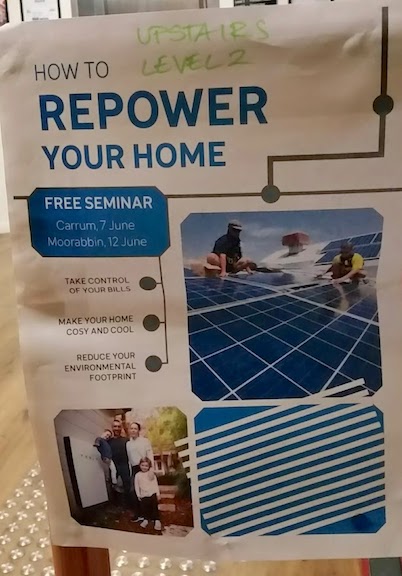
On Tuesday night, Environment Victoria and the Alternative Technology Association presented a seminar called Repower Your Home – one of the most informative events I’ve attended regarding the cost and value of ‘going solar’, and how renewable energy can help reduce energy costs and make Victoria, and indeed the world, a cleaner and more sustainable place to live.
Climate Change a huge issue, and in Victoria, as we head towards a state election in November, the production and consumption of energy and its cost a hot topic.
The 150 people present at the seminar were concerned about power prices but many also wanted to participate as a community to ensure whatever sustainable energy is produced, it is distributed fast, safe, and as fair as possible.
There were representatives from companies expert in providing advice and products to make homes more energy efficient. I came home with business cards and brochures plus memories of helpful, friendly conversations!
There is a lot of confusing and conflicting advice circulating, plus charlatans and cowboys prepared to take advantage of the gullible and ill-informed – more seminars like this are needed.
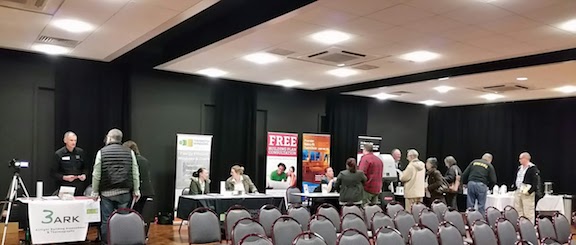
Alternative Technology Association
I have been a member of this organisation for over a decade because I wanted to support scientists, engineers and environmentalists who cared about a sustainable future – their magazine ReNew, one of the first I received digitally.
They have always been ‘looking to the future’ and their work on improving electric vehicles fascinating and persistent.
Years ago, recently widowed and facing the replacement of an old hot water system, I decided to go solar but was misled and ripped off by a company blanket marketing at the time and purporting to be experts. The installation of a solar powered hot water system became a nightmare of shoddiness and I eventually sought and achieved redress through the government ombudsman.
My ‘baptism by fire’ led me to join the ATA, do a lot more research about who to trust in this growth industry. The company that installed my main solar panels was recommended by the ATA and were reliable, efficient, and competitively priced.
For me, trust is always the key.
The Alternative Technology Association (ATA) is a not-for-profit organisation that enables, represents and inspires people to live sustainably in their homes and communities. Established in 1980, the ATA provides expert, independent advice on sustainable solutions for the home to households, government, industry and corporate clients.
The ATA has more than 6650 members across Australia walking the talk in their own homes. We have helped thousands of households save money and reduce their environmental footprint with information on energy efficiency, solar power, rainwater tanks, materials reuse and waste.
The ATA influences government policy by drawing on our technical expertise and members’ experiences. The ATA advocates in government and industry arenas for easy access to sustainable solutions as well as continual improvement of the technology, information and products needed to change the way we live. The ATA also provides consultancy services based on our technical expertise in energy, water and communications.
The ATA publishes two market-leading sustainable living magazines, Sanctuary: modern green homes and ReNew: technology for a sustainable future. The magazines have a combined readership of over 120,000.
The ATA has 14 active branches across Australia that meet regularly, holding informative seminars and workshops, sustainable house tours and attending fairs and events. We also provide an online and phone advice service for members.
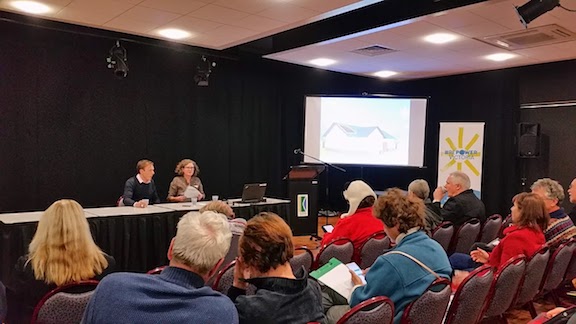
Guest Speaker, Keiran Price – Energy Analyst
Keiran is an energy analyst with the ATA who has worked on numerous projects assessing the benefits of solar installations for residents, businesses and local governments. Prior to joining the ATA, Keiran lived in London for four years and worked at the Office of Gas and Electricity Markets and the UK Energy Market Regulator, where he was involved in the development and administration of a number of renewable energy and energy efficiency schemes. Before moving to London, Keiran was a political staffer in South Australia, a position which inspired his passion for policies that support renewable energy, sustainability and the environment.
What Are You using Electricity For?
Keiran advised we should all check our bills and look at the retail tariff we are paying – all of us are probably being ripped off.
Choice magazine did a survey recently and reached the conclusion that to get the best tariff, you need to change your retailer every three months! Most people will not do that!
However, Keiran suggested we must shop around and the best place to look first is the Victorian Government’s website: Victorian Energy Compare a trustworthy site kept up-to-date.
Is There An Energy Crisis & How Do We Cope?
Keiran referred to a recent article in The Age about soaring power bills for a pub in Mordialloc.
(Of course, the owner just happened to be a member of the Liberal Party and the informant Matthew Guy, the Opposition Leader, who might have just shot himself in the foot if you read the comments on the article.)
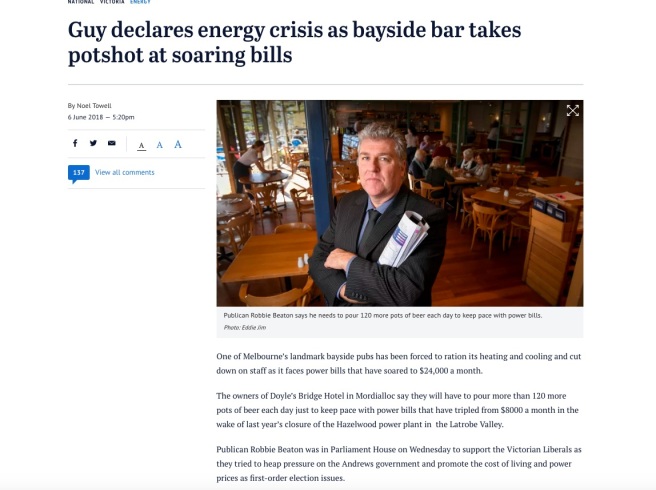
After suggesting, the pub’s owner could and should reduce consumption, Keiran explained how this can be done in most households.
6 Ways To Reduce Consumption
Keiran listed items in the order of those that consume the most energy:
- Install reverse cycle air conditioners – they are the most efficient for providing heating and cooling – the biggest consumers of electricity
- Install an efficient hot water system – shop around for a replacement before it is needed to get the best deal. Go electric with a heat pump hot water system being the most efficient.
- Appliances like dishwashers and washing machines can have a timer so they are used during the day and you get maximum benefit from solar panels. Avoid having a clothes dryer.
- Cooking – if you must cook with gas because you feel more comfortable then consider using portable bottles rather than mains gas because then you don’t pay supply charge of hundreds of dollars a year.
- Check your refrigerator is efficient – star rating on appliances important. Don’t have a second fridge in the garage ‘for beer’. Keep that second fridge turned off with the door slightly open, and only put it on before your party or the weekend or whenever the beer is going to be consumed.
- Lighting consumes electricity too – replace inefficient incandescent and halogen bulbs with LED. Turn screens off at powerpoint when not in use – television, laptops, desktop computers, phone battery chargers. Standby mode still uses power! Phone and tablet chargers referred to as ‘vampire load’ using just a little bit of power but if on all the time it still consumes energy!
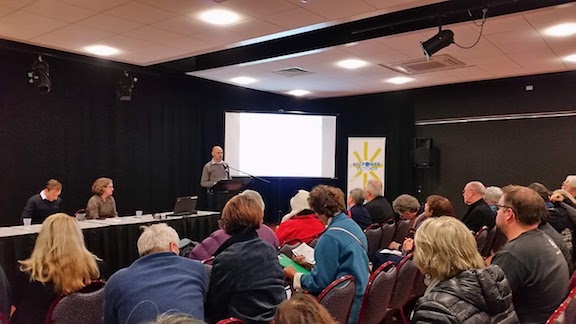
How Do you Make your Home More Efficient?
** Minimise heating and cooling.
- Roof and walls need insulation – a no-brainer.
- Keiran advised checking the insulation is still in the roof if you had workmen come for any reason, especially electricians, because they often disturb insulation to get access to wiring and then forget to return insulation to correct place.
- Pop your head up into the roof cavity and check your insulation is where it should be.
- Floorboards, windows and doors – retrofitting floors can be complicated but worth sealing or covering with carpet.
- There can be gaps and airflow and these should be minimised to stop draughts, also around windows and doors.
- Windows can be shaded – external in summer because on a hot day one square metre of warmed glass is the equivalent to running a bar heater!
- There are numerous ways of stopping direct sunlight onto glass in summer: plants, trees, blinds, sails, shutters…
- In winter you need good curtains to keep the heat in. No airflow over top and back out the bottom – install pelmets, they are important.
- Honeycomb blinds are the most efficient but any blinds are better than exposed windows.
- Run energy efficient appliances.
- Check the star rating – the number of stars important with up to $200 a year difference in usage.
- Eg, Even if an appliance with high star rating costs $500 more to buy than one that uses higher energy, remember that in a little over 2 years you will have saved that difference in energy costs.
Why Solar?
Having solar panels on your roof converts sunlight into direct current (DC), an inverter converts it into alternate current (AC) to power your home and appliances.
Any excess solar power is exported to the grid and you will be paid a feed-in tariff.
Some facts – In Australia March 2018:
- 1.8 million homes have rooftop solar
- That’s 20% of homes
- Or 4.7 million Australians living under solar
- Most get a good return for their investment
- Very few have battery storage but numbers are rising – 12% at the moment.
- Rooftop panels need space and access to the sun
- The standard system size is 5kw
Steps Towards Solar
- Get your home assessed for suitability
- Speak to your energy retailer and find out about tariff charges
- Find a solar retailer and installer
- Organise installation
- Maintain the system
Keiran emphasised that the industry is not boom or bust anymore, the market is more mature and a lot of the cowboys in earlier days have been weeded out. (Hallelujah!)
However there are still some shockers out there so don’t be ripped off.
The Clean Energy Council has an approved solar retailer list. These are companies that have signed a code of conduct.
- If you know people who have solar – listen to their experience because word of mouth recommendations can also be good indicators on who to avoid or employ.
- Get multiple quotes and check warranties There are 50 good solar companies in Victoria but get at least three quotes.
If installed properly, solar panels need little maintenance, usually, the rain cleans any dust or grime. Don’t be ripped off by ‘professional maintenance’ companies – this appears to be the latest marketing/moneymaking ploy.
Your investment is usually paid off in 4-6 years regardless of the size of the system you install.
4kw $4960
6kw $6900
8kw $9200
Average feed-in tariff is 11.3 cents but this reducing to 9 cents in July.
** People are now encouraged to put more panels on their roof so better to install a bigger system at the beginning.
There is an economic and environmental benefit to solar panels.
Environmentally – a 5kw system in Bayside is equal to saving 6.6 tonnes of CO2 annually and taking 2.2 cars off the road!
A Myth Exploded
- It is untrue that the amount of energy to make solar panels costs more than what is saved.
- In 1-2 years they pay back all energy used in their creation from mining, making, transporting to installing!!
- Economic and Environmental benefits are there!!
Feed-In Tariffs
People ask why are we only paid 11 cents for power when we put into the grid and yet we must buy at 25 cents?
The retail tariff includes:
- The companies generation costs at the power plant
- Transmission costs to network to various suburbs
- Distribution costs to maintain poles and wires
- Administration costs when retailers bundle the lot together
Your feed-in tariff does not offset distribution and transmission costs.
15-19 cent feed-in tariff is probably the highest you will get – unless you were among the lucky early takers on premium feed-in tariffs of 60 and 25 cents. These rates not available now.
There has been fluctuation over the years – dropped as low as 5 – 8, up to 11-12, will be down again to 9 cents in July.
Some retailers have introduced time-varying feed-in tariffs because electricity is worth more depending on the time of day.
In the early morning and overnight little demand so off-peak. Early evening it is peak period.
What has Changed In Victoria?
- There has been more demand because Hazelwood Coal Powered Station closed but also there is more solar going into the market.
- Peak time is getting later and shorter.
Off-peak shoulder peak evening rates
7.1 10.3 29
Solar panels peak period for generating is morning to the middle of the day when sun is hottest – to get an advantage of the movement of the sun, panels are now being aimed west as well as north because you want to generate power in the evenings.
Because of when most solar power is produced, it is not a good fit for time-varying feeds so make sure you
- Become an all-electric home – disconnect from gas!
- Set appliances like washing machines and dishwashers on timers
- Install an electric hot water system, set the timer or make sure it runs during the day from solar
- Reverse cycle air conditioners – set them to come on to heat or cool just before you come home – spread out their use
Batteries, Panels, Inverters
If you have a hybrid system you can charge a battery and leftover electricity is stored for reuse later in the day when the sun is not charging panels. A battery stores the excess generation from midday.
Why Add A Battery?
- Save money
- Store and reuse electricity
- A back-up in case power goes out
- Gives you energy independence
- Supporting development of new technology
A typical battery that has a rated capacity of 10kw will always have 20% retained so usable capacity will be 8kw.
You must first charge the battery to have at least 8.9kw to get the 8kw and it is better to use the electricity from the panels when first generated.
A battery should pay for itself in 10 years or it is not worth the investment.
Different types of batteries:
1. Lead acid – 40% usable capacity – 10-year life like a car battery
- Lithium iron – type you get in phones/tablets etc. discharge quicker but like the lead acid, capacity still degrades over time.
(The above two have the more proven technology.)
- Flow battery sodium ion – 100% usable capacity and more environmentally friendly.
Go for smaller battery – one that is filled up every day and emptied overnight.
Retrofitting a battery onto an older system is always terrible payback and not economical yet.
Batteries are only economical if installed at same time as solar panels and you get ‘a deal’.
**However battery prices are coming down. It depends a lot on your usage and consumption and there are some good deals – shop around!
- Batteries don’t have great benefit to the environment.
- Long term it does benefit the grid and development of the technology and less money is needed for poles and wires.
Going Off The Grid-
- For the average household, it is unlikely to be economic for decades. It will cost about $50,000.
- You still need a petrol or diesel generator as back-up.
- If $2000 annual bills – 25 years to pay going off the grid.
- It is much better to increase your solar system and export to the grid.
- Add more panels on the west facing roof to shift generator arc and it will be better payback than a battery. It may require a new or additional inverter.
- install a hybrid inverter and get battery ready.
There will be new options to sell excess energy :
- Reposit – sell to wholesale market via Diamond Energy
- Smart Homes – energy management systems directing solar to where it is needed: diverters (hot water), charging electric cars where solar generating
- Renters will have options too
- Solar financing – through council rates, negotiating good deals.
Question Time was Interesting
I love question time at events – hearing the thoughts and ideas of the audience, learning how much they have absorbed or what opinions they bring to an event…
In question time on Tuesday, a good point was made about the language we use – why talk about “payback” – we don’t use that term when we furnish our homes, renovate or decide to invest in having children!
Investing in solar panels should be regarded as an economic and environmentally sensible decision!
Another question raised the issue of quality of panels on the market – is German made best? (A few years ago German engineering and innovation considered the best, and in some people’s eyes, the only system to buy.)
Keirain said most German companies have moved operations to China and the majority of solar panel are made there now. He advised if you go with a good installer you will find they use good quality solar panel brand!
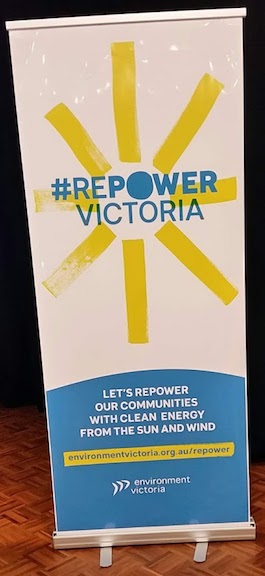
Environment Victoria’s Efficiency Officer, Anne Martinelli
Environment Victoria want to encourage more solar and renewables. In Victoria,
our energy system already transforming – Hazelwood closed in 2017 – the 9th large power station in Australia to close in 5 years.
- Renewable energy – large scale and household scale – transition inevitable as cost reduces.
- How it is managed and who benefits is not guaranteed.
20% of Victorian climate pollution comes from our homes so upgrading efficiency is important.
Many households face significant barriers:
- Access to accurate information – it is technically complex, the renewable sector changing rapidly, lots of misinformation around
- Cost – hurdles to bill saving – those who need it the most can’t afford upfront costs.
- Some people are locked out of rooftop solar for various reasons: they are renting, they live in an apartment block, the roof is unsuitable or not in right situation
Environment Victoria is focusing on making political parties have good policies for the coming November election.
- Home energy hubs like Scotland. A network of regional one-stop advisory service like what the old SEC Home Advisory Service used to be over 30 years ago!
Tariffs efficiency assessments, retrofit organisations, access to financial assistance. One stop shop for information from trusted sources. Scale up existing council community sector services.
Lots of organisations like ATA offer free advice but who knows they exist? - No interest, rates-based financing through councils of efficiency and solar upgrades. Currently, the Victorian Government has a pilot scheme with 22 councils helping aged pensioners and low-income households upgrade to solar. They aim to have 1000 participants and are monitoring daytime consumption. This should be scaled statewide.
- Virtual Power Plant – a partnership between government, industry and retailers that will finance solar and battery upgrades for low-income households, including those in social housing.
- No upfront costs, guaranteed household bills savings
- Maximise wider market benefits of solar and batteries
EG. South Australia Tesla batteries – company still owns battery but connecting 50,000 households in SA. Victoria could do three times that number – maybe scope with the election coming…
We need:
- Energy efficiency (not necessarily solar) standards for rental homes. The Residential Tenancies Act renewal a great opportunity to set standards at a basic achievable level to keep affordable.
- Make landlords invest in bill saving appliances, keep wiring and plugs efficient, LED lights.
- Evidence suggests: 50% homes for sale rated 5 stars or greater
40% rental houses = zero efficiency rating - We must set standards so rental properties have insulation etc – perhaps help landlords so they are not putting the costs on renters.
- There are 600,000 rental homes in Victoria.
Climate Change Is Real.
Working towards a sustainable lifestyle in our cities and countryside must be a priority.
This November use your voting power wisely – ask your local candidate
- do they have a commitment to renewables,
- a fairer society,
- a safer sustainable environment –
Then ask how they will achieve their targets!
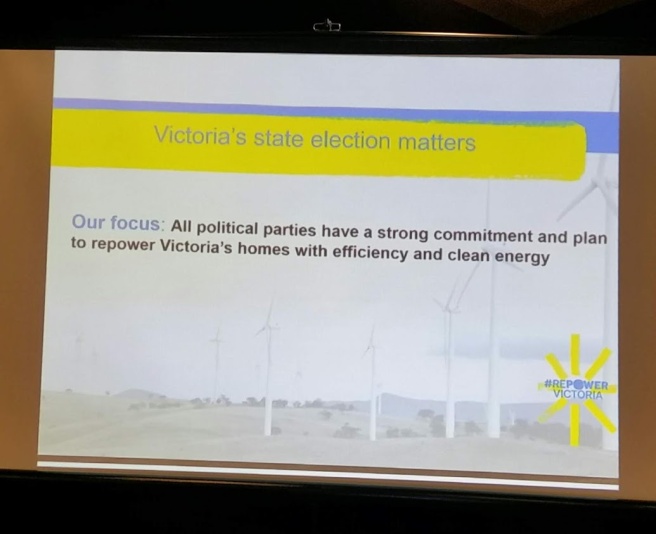

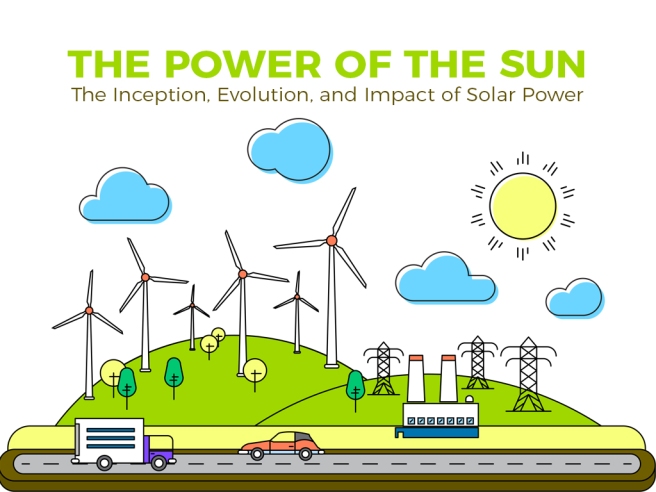

A great and informative article Mairi. Thanks for sharing what you learn. What a shame I’m married to a clod that won’t spend on solar!!! 😦
LikeLiked by 1 person
Thanks for reading Kaye. It was a great night – I learnt stuff I didn’t know and understand a lot more about the benefits. Can’t imagine you are a high user of energy – sustainability and Mother Earth personified you are!!
LikeLiked by 1 person
This is excellent, Mairi, we were early adopters of solar (HWS first, then roof-top panels) but I still learned new info from your summary. I hadn’t realised that retrofitting a battery isn’t cost effective, so we’ll adapt our plans to get one until costs come down.
I must concur with the shonky ‘maintenance’ info. AGL sent us a very threatening letter that said we needed to sign up (at a cost of $200+ p.a.) because if our system fell into disrepair we would be liable for the damage to their system. We threw it in the bin because our installer (Solahart, for both) had told us all we needed to do was to keep it clean, and the rain would mostly do that for us.
I do think the government needs to provide assistance for people to negotiate the maze. We recently had an energy assessment consultant at our place, and for a cost of $110, she correctly identified that AGL were ripping us off with *very* expensive tariffs (we’ve switched to Momentum) but also worked out why our bills were too high for people with 17 panels on the roof – it was our towel rail on 24/7 and eating electricity like rabbits eat lettuce! She also introduced me to the state government’s energy use website (sorry, I’m on my laptop and don’t have the URL) where I can monitor my use of energy daily, weekly, by season and by year, and even see the times of the day where I’m using more power.
A story for Kaye’s husband. One year, well after Easter, I got up at six as usual to go to work and the shower was freezing cold. Oh no, I thought, the gas booster has failed and the solar HWS hasn’t worked because the weather has been foul. Wrong. The gas booster wasn’t turned *on*. We had turned it off when we went away for our summer holiday *in January*, and the solar had worked so well, that it wasn’t until we had 3-4 days of really bad weather in late April that it wasn’t able to provide us with hot water. We had had three months of completely free hot water from the solar HWS and hadn’t realised it.
LikeLiked by 1 person
Thanks for reading Lisa and sharing your experience. When I could afford it, I took up solar and got a water tank put in too because I believed it is the best way for a sustainable future, but like you, I was watching for batteries to come down in price and even had dreams of going off the grid – I now know to seek more advice and not rush in! I’ve emailed Environment Victoria commending them for such an informative seminar – I hope it is replicated in many suburbs because there is a great desire in the community to embrace renewables but a lot of fear and misinformation too. Doesn’t help when some politicians and vested interests stir the pot.
LikeLiked by 1 person
Thanks Lisa – nice story but my hubby still won’t be convinced….think he’s just mean to the bone!! 😉
LikeLiked by 1 person
Maori I love it that you take the time and effort to write comprehensive articles. I live in a flat and can’t use your info unless I’m up for a struggle with the body corporate. But I will work with my daughter to do what’s best for her house (and 3 kids).
LikeLiked by 1 person
Thanks for reading Bill – I’m glad some people do:) – the heading says it all really – knowledge is power and I love sharing information, it helps start conversations. Fantastic your daughter has you to discuss things with and you never know if you bring it up with your body corporate they may take advantage of some of the different ways companies are working with apartments, units etc. to put in renewables. The great advantage of the Internet is spreading info and helping break down barriers. No one can get access to every bit of information or advice, or attend every seminar or conference and we’ve all got our own interests (and hobby horses:) ) but if what I discover is valuable I’ll try and do the best job I can to explain it and pass on links for people to learn for themselves. It was interesting the speakers were “millennials” and the majority of the audience were grey-haired baby boomers like me – we are the lucky ones able to own our own homes, have superannuation (even if it is “small”) and the luxury of choices many young people can only dream of in this era of unaffordable housing and insecure work. (better not get on my other hobby horse…)
LikeLike
Sorry about your autocorrected name, my new phone has odd ideas about spelling
LikeLiked by 1 person
No worries – it won’t be the first or the last time my name is misspelt:) Provides lots of stories – one woman actually asked me if I was a New Zealander until I pointed out she had spelt my name wrong:) I made a mistake with your name too if I remember – so ‘even stevens’:)
LikeLiked by 1 person